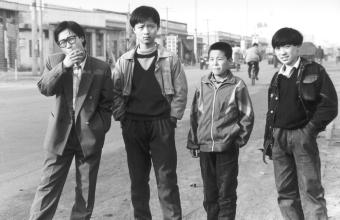|
|

|
Xiao Wu
Jia Zhang Ke China 1997 Produktion/production company: Radiant Advertising Co. (China) Hu Tong Communication (Hongkong) Weltvertrieb/world sales: Hu Tong Communication Rm 1.2/F, Johnston Court no. 14-16 Johnston Road Wanchai, Hongkong Tel./Fax: (85-2) 27195634 e-mail: hutcom@rocketmail.com Buch/screenplay: Jia Zhang Ke Kamera/cinematography: Yu Lik Wai Ton und Schnitt/sound and editor: Lin Xiao Ling Format: 16mm, Farbe/colour Länge/running time: 108 Minuten/minutes |
Kino 7 im Zoo-Palast Mi 18.2. 16.00 OmU Delphi-Filmpalast Mi 18.2. 19.30 OmU Arsenal Do 19.2. 10.00 OmU Akademie der Künste Fr 20.2. 17.00 OmU Babylon im Zeughauskino Sa 21.2. 17.00 OmU | |
|
Xiao Wu und Xiao Yong waren in ihrer Jugend enge Freunde. Xiao Wu schlägt sich heute als Taschendieb durch, übt aber seinen Beruf mit einer fast künstlerischen Hingabe aus. Xiao Yong dagegen ist in den Zigarettenhandel eingestiegen und dabei reich geworden. Er erscheint im Fernsehen und ist in der Stadt als Unternehmer bekannt. Xiao Wu fühlt sich von ihm verraten, glaubt aber immer noch, daß sie befreundet sind. In einer schmuddeligen Karaoke-Bar lernt er Mei Mei kennen und begreift, daß er von nun an ihr Sklave ist. Liang Chang Yau, Xiao Wus Vater, lebt in einem kleinen Bergdorf und ist sehr stolz auf seine Herkunft. Hin und wieder besucht ihn Xiao Wu. Dabei kommt es eines Tages zum Konflikt mit seinem Vater. Jia Zhang Ke: ''In diesem Film geht es um unsere Ängste und unsere Unruhe. Wertvolles verschwindet aus unserem Leben. Wir müssen in einer nicht-funktionierenden Gesellschaft zurecht kommen und flüchten uns in die Einsamkeit, die nicht mehr als ein Ersatz für die Würde ist. Und es geht um Gefühle, nicht um ihre Zerstörung, sondern um den Verlust der Strukturen, in denen Gefühle möglich sind. Die Leute sind Gefangene der Straße, eingefangen in Chaos, Geschrei und kurzlebigen Beziehungen. Sie rennen sinnlos umher, ergötzen sich an Perversitäten, singen laute, knallige Lieder unter dem alten Pavillon. Und schließlich geht es meinem Film um meine Heimatstadt und das gegenwärtige China, um die Ungleichheit, die zwischen der Oberfläche des Lebens und dem Innenleben der Menschen, ihren Hoffnungen und Wünschen existiert.'' Jia Zhang Ke, geb. 1970 in Fenyang. 1997 Abschluß des Studiums an der Beijinger Filmakademie. Xiao Wu ist sein erster abendfüllender Spielfilm. |
Xiao Wu and Xiao Yong used to be great friends in their youth, working together as pickpockets in their adolescence. Xiao Wu is still a pickpocket, practising his trade with artisan-like devotion. Xiao Yong, on the other hand, has moved up in the world. Busy trafficking cigarettes, he has become rich. Xiao Wu feels betrayed, but still believes that they will be pals until the end of time. In a dingy Karaoke bar, Xiao Wu falls in love with Mei Mei, a physically strong lady from the North, and knows that she is divine and that he is her slave. Liang Chang Yau is Xiao Wu's father. He has spent all his life in a small mountain village. He is very proud of his peasant family tree of three generations. From time to time Xiao Wu likes to return to his native village to see his family. One day, however, he finds his affections rejected. Jia Zhang Ke: ''This is a film about our worries and our uneasiness. Valuable things are vanishing in our lives. Having to cope with a dysfunctional society, we take refuge in solitude which is a substitute for dignity. It is also a film about emotions. It doesn't deal with the destruction of emotions as such, but with the loss of the framework in which feelings are possible. People are trapped on the streets, in chaos, screams and shouts and short-lived relationships. It is finally a film about my native town and about contemporary China. It is also about the disparity between the surface of life and peoples' inner worlds, their hopes and desires. Above all, it is a film about some burning issues in our existence.'' |

